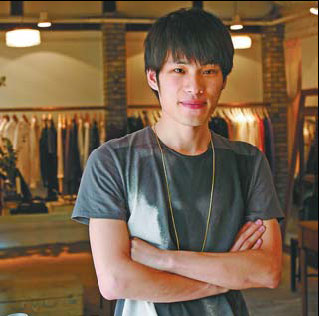Beijing boutique strikes optimistic note for designers
Updated: 2011-08-12 15:18
By Lin Jing (China Daily)
|
|||||||||||
 |
|
Wang Yaoyu wants to turn his studio, Dong Liang, into an incubator for Chinese fashion designers. Zhang Tao / China Daily |
Wang Yaoyu's black T-shirt and skinny jeans are appropriate work attire for this 29-year-old.
He is part owner of Dong Liang Studio, one of the first boutique stores in Beijing devoted toshowcasing independent Chinese designers' products.
In November 2009, Wang and his business partner, Nan Lang, opened the retail store inWudaoying hutong, Dongcheng district.
Wang says the quiet hutong, a narrow alley, is the perfect location for a boutique store.
"Right now there are only a small number of people into designer clothing, so it's not necessaryto put Dong Liang in a noisy shopping mall," he says.
With its clean and simple design, the store's decor reflects an old Chinese home. The woodendesk and exposed beams give it an antique look.
But no typical Chinese elements can be found in the clothing. Most of the items have a Westernfeel, and come mainly in two colors: black and white.
Wang says they only choose clothing lines that have a consistent style and fine fabric. "Theclothing should first be practical for daily wear, and have a simple but classical style, which iseasy to carry," the designer says.
Looking back on his business venture, he says he shares something in common with buddingfashion designers: the difficulties of starting a new business.
"Most young Chinese designers are only just starting out and experiencing really hard times,"he says. "Barely any of them can make ends meet. The fact is, most of them are still losingmoney in designing."
Wang says that the most challenging part of starting his business was convincing designers tojoin Dong Liang. "At first, many designers doubted our abilities. So we had to present them witha feasible proposal and demonstrate our sincerity about long-term cooperation."
It took three months for Wang and his partner to find independent designers with a maturedesign style and a complete line. But the dedication paid off.
In one year, the number of designers featured in the store has grown from five to 21. And nowhe is the one getting calls and e-mails from designers asking for help.
"Some designers would like to join Dong Liang, because it is a recognition of their design styleand product quality."
Some designers they select to showcase in their store have already gained a reputation inChina, such as VegaZaishiWang, the owner of the brand SFORZANDO, and Ye Qian, thedesigner of Ye's.
Wang says he fully understands the predicament Chinese designers find themselves in.
"As the market improves, more designers are opening their own design studios and building uptheir brands," he says.
"But the process is not that easy. The first obstacle is financing. But investors seldom givelarge amounts of money to designers and wait for the brand to mature and become well known.It takes persistence."
He adds that young designers cannot afford to spend the time and energy on marketing andpromotion when there are so many other details to worry about.
"Fabric and production is also an issue. It is hard to find good fabric at reasonable prices,especially at a time when commodity prices are increasing," he says.
But he is still confident about the future of Chinese designers. "I would quit if I did not have anyconfidence," he laughs.
Business is booming for Dong Liang, which sells clothing for more than the market average,ranging from $46 to $916, depending on the fabric and designer.
And their products have drawn the attention of Chinese celebrities. Zhou Xun, a mainlandactress and Valen Hsu, a pop singer from Taiwan, are among Dong Liang's frequentcustomers.
But Wang is looking at the bigger picture. He says Dong Liang wants to collaborate withdesigner stores in Western countries to introduce Chinese brands to the world, and influencemainstream fashion trends.
"Designers' products should not always appeal to a niche customer. After all, they are stillcommercial products," he says. "Every well-known brand, such as Louis Vuitton and Gucci, hasexperienced the same path, from a small consumer base to the (larger) public.
"It is an inevitable road for Chinese designers as well."